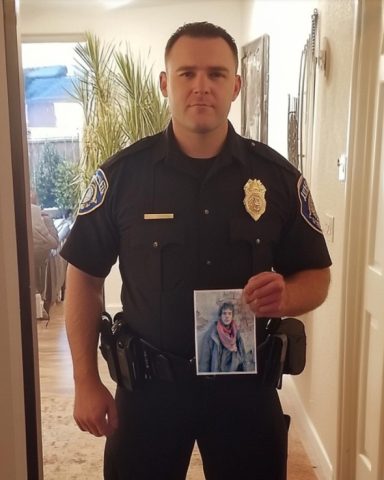
It was one of those freezing January afternoons where the cold seemed to bite through every layer of clothing, making it feel like the chill was deep inside your bones. I had just finished running errands—grocery shopping and picking up dry cleaning—and decided to stop by St. Peter’s Church.
I wasn’t sure why, but something inside me urged me to go there, maybe because I needed some quiet in the middle of all the noise of everyday life. Little did I know, this small decision would change two lives forever.
As I walked up the church steps, I saw him—a young man, no older than thirty, sitting at the foot of the stairs. His coat was torn and frayed, his fingers were red and raw as he tried to tie his shoes, which were barely held together with twine. His head was uncovered, and his shoulders were slumped in a way that made him look defeated.
I paused for a moment, unsure of what to do. What if he didn’t want help? What if he was dangerous? But when he looked up, his dark, hollow eyes met mine.
There was something in his gaze that made me hesitate—something so fragile and vulnerable that it made my doubts melt away. I knelt down beside him, ignoring the cold stone of the steps pressing into my knees.
“Hi there,” I said gently. “Can I help with your shoes?”
He looked up at me in surprise, as if he didn’t expect anyone to notice him. “You don’t have to—” he started to say, but I interrupted him before he could finish.
“Let me,” I said, my voice soft but firm. I untied the knotted string holding his shoes together and tried to fix them as best as I could. My fingers stung from the cold, but I didn’t mind.
When I was done, I reached for the scarf around my neck—a thick gray knit scarf my husband, Ben, had given me years ago. It was my favorite, but I knew he needed it more than I did. Without a second thought, I draped it over his shoulders.
“Here. This will help,” I said softly.
The man’s lips parted, as though he wanted to protest, but no words came out. I quickly crossed the street to a nearby café, where I bought a large cup of hot soup and tea. When I came back, I handed them to him. His shaking hands accepted the warm cups, and I scribbled my address on a piece of paper.
“If you ever need a place to stay or someone to talk to,” I said quietly, “come find me.”
He stared at the paper in my hand, his voice shaking when he asked, “Why? Why are you doing this?”
“Because everyone needs someone,” I answered, looking him in the eyes. “And right now, you need someone.”
His eyes filled with tears, but he didn’t speak. He only whispered, “Thank you.”
I smiled and walked away, glancing over my shoulder once to see him sipping the soup, huddled against the cold. I didn’t ask for his name, and I didn’t expect to see him again.
Years passed. Ten years, to be exact. Life went on with its usual mix of joys and challenges. My husband and I celebrated twenty-two years of marriage, and our children, Emily and Caleb, were growing up. Emily was preparing for high school graduation, and Caleb, in the chaos of being fourteen, was learning what it meant to be a teenager.
One quiet Tuesday evening, I was sitting in the living room, sorting through bills. There was a knock at the door. I opened it, and to my surprise, there stood a police officer. My heart raced with worry. Was something wrong with one of my children?
“Good evening, ma’am,” he said politely. “Are you Anna?”
“Yes,” I replied, trying to steady my voice. “Is something wrong?”
The officer pulled out a photograph from his jacket pocket and handed it to me. “Do you recognize this man?”
I gasped. The photo was blurry, but I could see the man’s worn shoes, the scarf—everything came rushing back.
“Yes,” I whispered, my voice faltering. “I remember him. Who is he?”
The officer gave me a soft smile. “Ma’am… it’s me.”
I stood there, stunned, my mind racing. “You?”
He nodded, and his voice grew thick with emotion. “You saved me that day.”
I couldn’t believe it. Memories of that cold afternoon flooded back. “What happened to you after that? How did you—” My voice trailed off as I tried to make sense of it all.
He smiled faintly. “That day, you gave me more than soup and a scarf. You gave me hope. I kept your address, and I showed it to the church pastor. He helped me find my aunt—the only family I had left. She thought I was dead. But she took me in, and I started rebuilding my life. I got an ID, found a job, and began fighting my way out of addiction.”
He paused, and I could see the tears in his eyes. “It wasn’t easy, but I kept that scrap of paper and the scarf as reminders of your kindness. Those things helped me get through the darkest times. Eventually, I joined the police academy. I’ve been an officer for six years now, and I’ve spent all this time trying to track you down, just to say thank you.”
My eyes filled with tears as he spoke. “I didn’t do anything extraordinary,” I said softly, wiping my eyes.
“You did more than you know,” he said, his voice full of conviction. “You saw me when no one else did. That made all the difference.”
I was so overwhelmed that I stepped forward and hugged him. He wrapped his arms around me, and I could feel the strength of his gratitude.
“Do you still have the scarf?” I asked, managing to laugh through my tears.
He smiled. “I do. It’s in my drawer at home. I’ll never let it go.”
That night, after he left, I sat down with Ben in the living room, sharing the incredible story. Ben took my hand in his, his voice soft as he said, “You gave him a second chance.”
I smiled, wiping away the last of my tears. “No,” I said quietly, “he gave it to himself. I just opened the door.”
Sometimes, it’s the smallest acts of kindness—a scarf, a warm meal, a few kind words—that ripple out and touch more lives than we can ever imagine. And sometimes, those ripples return to us, reminding us that even the smallest gestures can change someone’s life forever.
What do you think of this story? Feel free to share your thoughts in the comments below!





